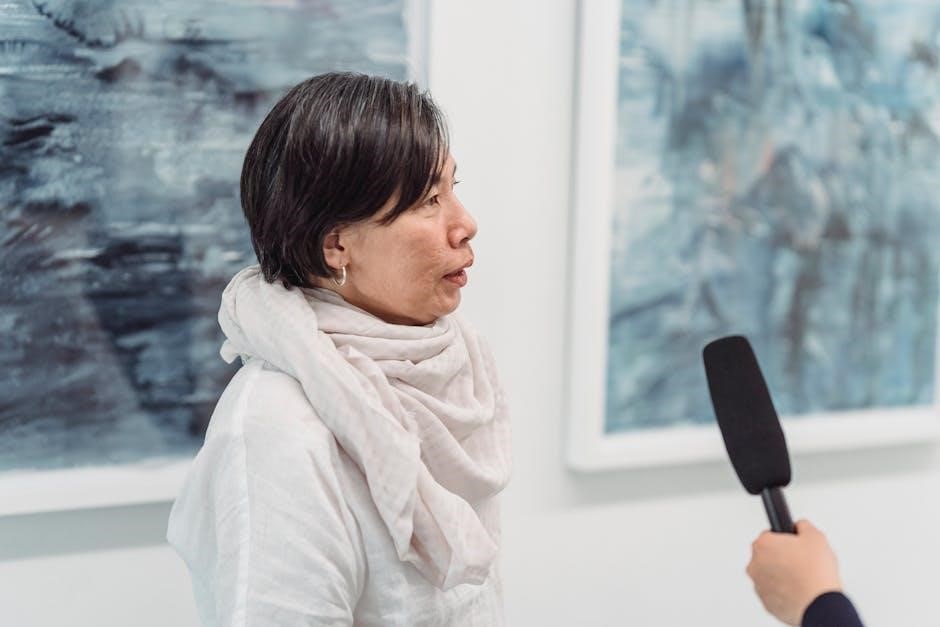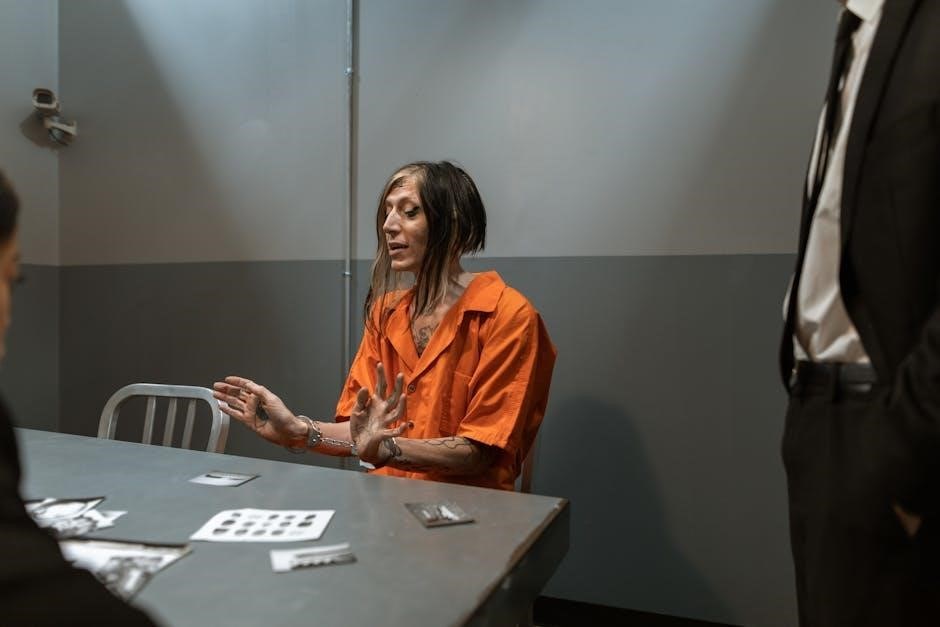
Obtaining an F1 visa requires careful preparation‚ and understanding common interview questions is crucial․ This guide provides a comprehensive list of questions‚ answers‚ and tips to help students confidently navigate their visa interview‚ increasing their chances of success․
Overview of the F1 Visa Interview Process
The F1 visa interview is a critical step for international students seeking to study in the United States․ Conducted by a visa officer‚ the interview assesses the applicant’s eligibility‚ intentions‚ and preparedness․ It typically begins with introductory questions about the applicant’s background‚ followed by detailed inquiries about their academic plans‚ financial stability‚ and post-graduation intentions․ The process also evaluates English proficiency and the student’s ability to adapt to U․S․ culture․ Applicants are expected to provide clear‚ honest‚ and concise answers‚ supported by relevant documents such as admission letters‚ I-20 forms‚ and financial statements․ Preparation is key‚ as the interviewer aims to ensure the student’s commitment to their studies and compliance with visa regulations; A confident and genuine demeanor‚ combined with thorough knowledge of their program and goals‚ significantly enhances the likelihood of a successful outcome․

Common F1 Visa Interview Questions
Common F1 visa interview questions cover academic goals‚ university choice‚ financial plans‚ post-graduation intentions‚ and English proficiency․ Preparation is key to addressing these topics confidently and clearly․
Questions About Academic and Study Plans
Academic-related questions are a cornerstone of the F1 visa interview․ Applicants are often asked about their reasons for choosing a specific university or program‚ their academic background‚ and future career goals․ Questions like‚ “Why did you choose this university?” or “How does this program align with your career aspirations?” are common․ Applicants may also be asked to elaborate on their field of study‚ such as‚ “What sparked your interest in this subject?” or “How do you plan to apply the knowledge gained?” It is essential to demonstrate a clear understanding of the program and how it fits into long-term goals․ Be prepared to discuss specific courses‚ professors‚ or research opportunities that attract you to the institution․ Honesty and alignment with the program’s objectives are key to making a positive impression․ Researching the university thoroughly will help in providing confident and relevant responses․
Questions About Financial Stability and Sponsorship
Financial stability is a critical aspect of the F1 visa interview․ Applicants are often asked about their ability to cover tuition‚ living expenses‚ and other costs․ Questions may include‚ “Who is sponsoring your education?” or “How will you fund your studies?” Be prepared to provide detailed information about your financial resources‚ such as bank statements‚ scholarships‚ or sponsor letters․ If relying on family support‚ explain their financial capacity․ For scholarships‚ clarify the terms and amount․ Applicants may also be asked about their understanding of living costs in the U․S․ and how they plan to manage expenses․ It’s essential to demonstrate that you have sufficient funds for the entire duration of your studies․ Avoid vague answers and ensure all financial documents align with the information provided in your I-20 form․ Honest and transparent responses are key to proving your financial stability and commitment to your studies․
Questions About English Proficiency and Adaptation
English proficiency is a key area of focus during the F1 visa interview․ Applicants may be asked‚ “How long have you been speaking English?” or “What is your TOEFL/IELTS score?” Be prepared to discuss your language abilities confidently․ Questions about adaptation may include‚ “How will you handle cultural differences in the U․S․?” or “How do you plan to make friends?” Highlight past experiences in international settings or diverse environments to demonstrate your ability to adapt․ Additionally‚ you may be asked about your experience with academic writing‚ reading‚ and speaking in English․ Emphasize your preparation and willingness to engage with the U․S․ education system․ Honest and clear responses about your language skills and adaptability will help reassure the visa officer of your readiness to succeed in an American academic environment․ This is your opportunity to showcase your communication skills and cultural awareness․
Questions About Post-Graduation Plans
Visa officers often ask about your plans after completing your studies to assess your intent to return home․ Common questions include‚ “What are your plans after graduation?” or “Do you intend to work in the U․S․ or return to your home country?” Be prepared to explain how your education aligns with your future career goals․ You may also be asked‚ “How will your studies benefit your home country?” Highlight specific skills or knowledge you plan to apply․ Additionally‚ questions like‚ “What if you don’t get a job in your field?” or “Do you have plans to pursue further education?” may arise․ Provide clear‚ realistic answers that demonstrate your commitment to returning home and contributing to your country․ Avoid sounding uncertain or overly focused on remaining in the U․S․ Show a genuine understanding of how your education will benefit your future and align with your long-term aspirations․ This is your chance to prove your intent and responsibility․ Stay focused‚ honest‚ and enthusiastic in your responses․ Your answers should reflect a clear vision and practical planning for life after graduation․ By addressing these questions thoughtfully‚ you can strengthen your case for obtaining the F1 visa․ Your ability to articulate a well-defined plan will help build confidence in your intentions․
Preparing for the F1 Visa Interview
Thoroughly research your university and program‚ practice answering common questions‚ and ensure all documents are organized․ Honesty‚ clarity‚ and confidence are key to a successful interview․
Researching the University and Program
Researching the university and program is essential for a successful F1 visa interview․ Understand the institution’s academic offerings‚ faculty expertise‚ and campus resources․ Review the program’s curriculum‚ specializations‚ and how they align with your career goals․ Familiarize yourself with the university’s location‚ cost of living‚ and cultural environment․ Be prepared to explain why you chose this specific program and how it fits your academic and professional aspirations․ Additionally‚ gather information about the university’s reputation‚ rankings‚ and alumni success stories․ This knowledge will help you confidently answer questions like‚ “Why did you choose this university?” or “How does this program align with your future plans?” Demonstrating a genuine understanding of the program and institution showcases your commitment and preparedness to the visa officer․
Practicing Responses to Common Questions
Practicing responses to common F1 visa interview questions is vital to ensure confidence and clarity during the actual interview․ Review lists of frequently asked questions‚ such as those found in F1 visa interview questions and answers PDF guides․ Focus on questions about your academic background‚ study plans‚ financial stability‚ and post-graduation intentions․ Use online resources or consult with mentors to refine your answers․ Conduct mock interviews with friends or advisors to simulate real-life scenarios and receive feedback․ Practice articulating your goals clearly and concisely․ Be prepared to discuss your university choice‚ program specifics‚ and how they align with your future aspirations․ Additionally‚ review your I-20‚ admission letters‚ and financial documents to ensure you can address any related questions accurately․ Honest and well-prepared responses will help you present a strong case for your visa approval․
Understanding the Importance of Documentation
Documentation plays a pivotal role in the F1 visa interview process‚ serving as the cornerstone of verifying the applicant’s eligibility and intentions․ The I-20 form‚ issued by the university‚ is the most critical document‚ as it confirms enrollment and outlines the program details․ Financial documentation‚ including bank statements and scholarship letters‚ is essential to demonstrate the ability to cover tuition and living expenses‚ ensuring the applicant can sustain themselves without resorting to unauthorized employment․ Admission letters and academic transcripts validate the applicant’s academic credentials‚ confirming their preparedness for the chosen program․ The SEVIS fee receipt is required to verify enrollment in the Student and Exchange Visitor Information System‚ ensuring compliance with immigration regulations․ Additionally‚ a detailed study plan outlines academic objectives‚ helping to establish a clear and focused intention․ Proof of English proficiency‚ such as TOEFL or IELTS scores‚ is necessary to assess readiness for an English-speaking academic environment․ Affidavits of support from sponsors further reinforce financial stability․ Organizing these documents meticulously facilitates a smooth interview process‚ showcasing responsibility and preparedness․ Ensuring all documents are complete and readily available avoids delays and complications‚ underscoring the applicant’s seriousness and commitment to their studies in the US․ Through thorough preparation and understanding of each document’s significance‚ applicants can navigate the visa process effectively‚ enhancing their chances of approval․

Common Mistakes to Avoid During the Interview
Avoid overpreparing‚ as it may make responses sound rehearsed․ Dishonesty‚ inconsistency‚ or lack of knowledge about your program can harm credibility․ Poor documentation or financial proof can lead to rejection․
Overpreparing or Sounding Rehearsed

Overpreparing for an F1 visa interview can lead to responses that sound rehearsed‚ which may raise concerns about authenticity․ While preparation is essential‚ it’s important to maintain a natural tone․ Visa officers value genuine and spontaneous answers‚ as they reflect the applicant’s true intentions․ Rehearsed responses often lack personal touch and may appear insincere‚ potentially harming credibility․ Additionally‚ overpreparation can cause nervousness‚ leading to awkward delivery․ To avoid this‚ practice answers but ensure they sound conversational․ Be ready to adapt to unexpected questions‚ showing your ability to think critically․ Remember‚ the goal is to present yourself authentically while demonstrating clarity and confidence․ Striking this balance is key to making a positive impression during the interview․ Avoid memorizing answers verbatim‚ as this can make you appear robotic rather than genuine․ Instead‚ focus on understanding the underlying themes and tailor your responses accordingly․
Providing Inconsistent or Dishonest Answers
Providing inconsistent or dishonest answers during an F1 visa interview is a serious mistake that can lead to rejection․ Visa officers are trained to identify discrepancies in responses‚ which can raise concerns about the applicant’s credibility and intentions․ Inconsistent answers‚ such as conflicting statements about financial support or study plans‚ may suggest a lack of preparation or dishonesty․ Dishonesty‚ on the other hand‚ can result in immediate denial and potential future ineligibility for U․S․ visas․ It is crucial to ensure that all information provided is accurate and aligns with the documents submitted․ Applicants should review their forms‚ such as the I-20 and financial statements‚ to maintain consistency; Honesty and transparency are essential to building trust with the visa officer and demonstrating genuine intent to study in the U․S․ Avoiding this mistake requires careful preparation and a commitment to truthfulness in all responses․

Preparing thoroughly for your F1 visa interview is essential for a successful outcome․ Reviewing common questions‚ practicing articulate responses‚ and ensuring all documents are in order will significantly boost your confidence․ Stay calm and genuine during the interview‚ as honesty and clarity are key․ Avoid memorizing answers; instead‚ focus on understanding the intent behind each question․ Highlight your academic goals‚ financial stability‚ and post-graduation plans clearly․ Demonstrating strong English proficiency and a positive attitude will also make a favorable impression․ Lastly‚ stay informed about visa policies and updates to ensure compliance․ With dedication and proper preparation‚ you can confidently navigate the F1 visa interview process and achieve your goal of studying in the United States․ Remember‚ this is an opportunity to showcase your potential and enthusiasm for your educational journey․
